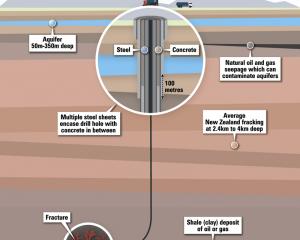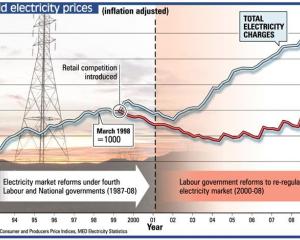Here we are all of a sudden at the beginning of the second decade of the 21st century. Just yesterday, it seems, we were watching out for any Y2K disruptions while celebrating the new millennium. Now a new set of problems threatens our treasured Kiwi lifestyle and life quality, our values, our prosperity and the long-term viability of our country.
Our tired old economy is flagging despite relief from recession. We work longer hours but achieve lower productivity than others in the OECD.
Our social systems are groaning.
Our exports and tourism are under threat as international media and bloggers slag us off for the gap they perceive between our 100% Pure New Zealand brand and our actual behaviour.
And as a small pastoral economy, we are at risk of being sucked dry by spiralling resource costs because of the increasing affluence of emerging economies.
Amazingly, as often happens at critical times, a solution is within our reach, just waiting for our uptake.
That solution is the "green wave", which, while it is slow-rolling at present, will over the next decade gather force and bring an economic boom on a scale to rival the information age and the industrial revolution.
We can jump on this wave or get buffeted in the wake.
If we choose to ride it and grasp the opportunities it presents, we can become a leading voice in the world, and in the process re-create paradise in New Zealand.
Our lifeline is in the development and commercialisation of innovative green technologies in the areas of clean energy, clean transportation, clean industry, clean agriculture and the environment.
If we wholeheartedly embrace this, we can achieve a clean, low-carbon economy that is highly efficient and fiercely competitive.
There will be new prosperity for all New Zealanders, new jobs and retraining, higher-value exports and a stronger eco-brand to attract overseas tourists and consumers.
The nay-sayers talk about the cost of developing and implementing clean technologies. But the fact is the opportunities far outweigh the costs.
Denmark, with a similar population to New Zealand, decided to champion wind energy and now supplies over half the world's wind turbines.
They have added tens of thousands of high-value jobs to their economy, reduced their carbon intensity by a third in 10 years, dramatically reduced their exposure to imported energy costs and created a new export business the size of Fonterra.
Germany and Sweden, also early movers in green-tech, have had similar results and the rest of the world is beginning to wake up.
In the United States, President Barack Obama has vowed significant investment to move to an alternative energy economy.
American businesses are investing heavily in the development and deployment of clean technologies as the basis of the country's next wave of wealth generation.
Countries and organisations who are investing in clean technologies also make savings from reduced expenditure on raw materials and energy, greater efficiency and reduced waste at a huge rate of return on their investments.
And they are future-proofing themselves against scenarios such as the spiralling oil costs and a worldwide resource-grab that small countries like New Zealand can only lose.
New Zealand is blessed with huge natural advantages in this arena.
Hundreds of Kiwi companies are already riding the green wave and quietly achieving marvels from start-ups such as Lanzatech, which is making ethanol from flue gases and has attracted big capital to do it, to giants such as Air New Zealand, which has just been recognised as the world's greenest airline.
Todd Energy is investing in tidal power generation in the Kaipara and our biggest exporter, Fonterra, outlined its benefits from climate change, energy and sustainability strategies at the World Environment Day symposium in June.
To really win this game as a nation, to do a Denmark, we need to identify our greatest opportunities - clean agriculture and various renewable energy sources are obvious candidates - then pin our ears back and go for them.
This would involve a combination of initiatives such as a tax framework to encourage clean-tech investment and research grants to attract the world's top scientists in the selected fields.
Business and government, research and tertiary institutes must work together to bring us to the forefront of the green wave.
We must align our goals and strategies to seize the opportunities before us.
We Kiwis can be an odd mix.
At one time, we can be fired with creativity and innovation, and solve huge problems with No 8 wire ingenuity.
At another time, we can be dour, stern and straight-mouthed, and stolid in our obstinacy against change.
But by riding at the forefront of the green wave, we can have equitable prosperity, quality of life, the ability to live our values and an economy that is viable over the long term.
My New Year's wish is for our businesses and organisations, the Government, and research and tertiary institutions, to create a shared vision of our gutsy country riding at the forefront of the green wave.
We led the world on antinuclear and anti-apartheid action, and on getting the vote for New Zealand women.
We can lead the world out of the Age of Stupid by doing the right thing for ourselves and the planet.
Why chase Australia by busting a gut to raise productivity and wages under our tired, old economy? Let's lead the green revolution, and bypass and surpass Australia with a strong, clean economy.
This is a once-in-a-lifetime opportunity.
• Phillip Mills is executive director of Les Mills International. He received a World Class New Zealand Award for New Thinking in 2009 and was Ernst & Young NZ Entrepreneur of the Year in 2004.





